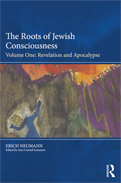
 |
Noted psychologist and philosopher Erich Neumann spent some years composing this work, which deals with the development of Jews as individuals and of Judaism collectively, against a backdrop of the rise and accession of power of Nazism in his birth country. A Zionist who emigrated with his family to Tel Aviv in the early 1930s, Neumann was still crucially affected by the happenings in Germany. His observations were colored by those events and also by his close association with Carl Jung and the psychology of consciousness and creativity.
Neumann was and knew himself to be a pioneer in the exploration of the nature of the individual Jewish psyche. In expounding on the issue of revelation, he emphasized what he considered an essential piece of the puzzle of Jewish history, which he designated as “prophetism.” The early Israelites, having “failed” collectively in their wanderings, were inspired by Moses and YHWH’s revelation to him of the Ten Commandments on Mt. Sinai. Jews subsequently became reliant on individual priests and prophets to deliver and interpret the word and will of YHWH. Personal vision was suspect, and the stress was on obedience to prophets who would reveal sacred messages and codify them into law. Early Jews differed from other peoples of their time in their suppression of the feminine deity, an issue that Neumann found particularly significant in the development of his psychological theories. For Jews, this deficit of the feminine in their worship life led to an intuitive deifying of the earth as a “goddess” and an association of the state of Israel with that feminine, rooted principle.
These traditions held sway, even as history altered the circumstances of the Jewish people. Neumann states that “the dominance of ethical responsibility” gripped the individual Jew, resulting in an introversion of personality. Many of these themes intersect with Neumann’s strong connection to the work of Carl Jung. In his thirst for a homeland, Neumann says, the Jew wandered, seeking new roots in a phase of “secondary nomadism.” There is little doubt that Neumann related the “apocalypse” referenced in the second half of this volume to the persecution of Jews during the time of his writing. He speaks of the necessity for Jews, even as they settle, to “observe one’s neighbors with care” to discern when they might suddenly wish to “sate themselves on the blood of Jews,” making them the "scapegoat" for their neighbors' negative attitudes.
Neumann’s work was intended as a three-volume set but ultimately limited to two and never published. This noteworthy new opus was a collective effort. In her preface, Nancy Swift Furlotti suggests that to have published his work at the time of its composition would have endangered the author. It is also reasonable to theorize that Neumann’s intense focus on Jewish consciousness resulted from his own need to contextualize his personal beliefs in the light of harrowing world events that threatened to eradicate Judaism altogether from the globe. Neumann was more than a psychologist, as he amply proves here. The volume spans centuries and delves deeply into human psychology, ancient and modern culture, and offers special wisdom regarding evolving history. Though the subject matter is ponderous and at times dark, there is an infusion of positivity and hope that can perhaps best be seen in Neumann’s watercolor artworks, depicting in a bold hue and childlike realism Moses’ vision of the Holy Land and Joseph’s dream. Scholars and thoughtful individuals, as well as students of history, Jewish culture, and psychology, will doubtless seize the opportunity to read this most recently recovered treatise by one of the twentieth century’s boldest and most innovative thinkers.
A 2020 Eric Hoffer Book Award Category Finalist
RECOMMENDED by the US Review